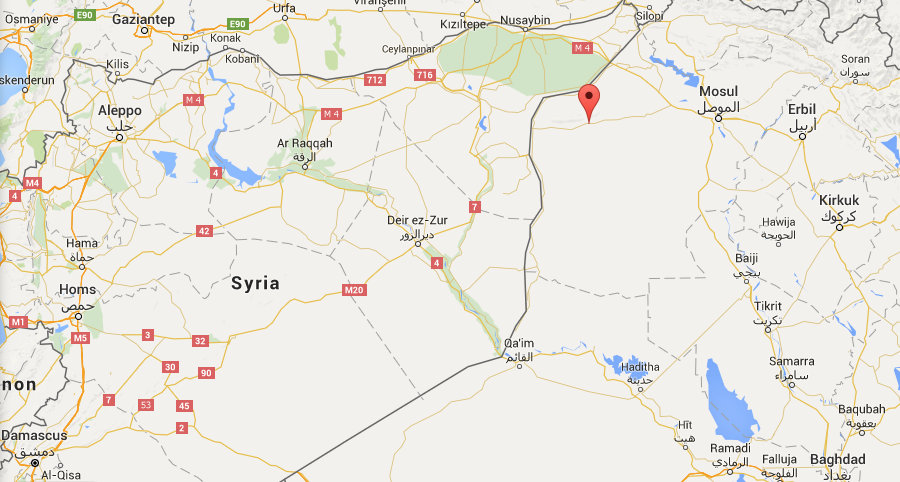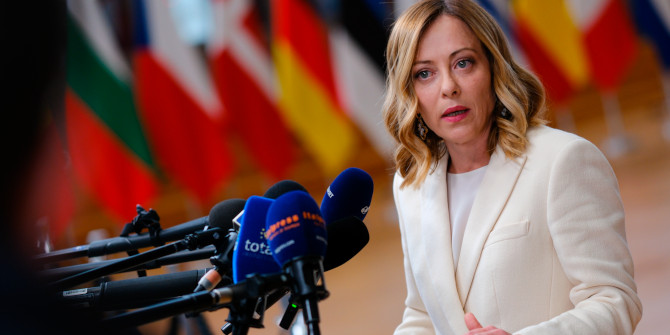 The French government has stated that it will invoke the EU’s ‘mutual defence clause’ in relation to the Paris terrorist attacks, which indicates that when a state is attacked, all member states must show solidarity in addressing the aggression. Ranj Alaaldin writes on the potential military response France and its other western allies might pursue in Iraq and Syria in the coming weeks. He argues that inaction is no longer an option and that while the lessons of previous interventions such as those in Libya and Iraq must be learned, the West can and must intervene when it either faces grave and immediate threats or where proponents of reform face repression by state or non-state actors.
The French government has stated that it will invoke the EU’s ‘mutual defence clause’ in relation to the Paris terrorist attacks, which indicates that when a state is attacked, all member states must show solidarity in addressing the aggression. Ranj Alaaldin writes on the potential military response France and its other western allies might pursue in Iraq and Syria in the coming weeks. He argues that inaction is no longer an option and that while the lessons of previous interventions such as those in Libya and Iraq must be learned, the West can and must intervene when it either faces grave and immediate threats or where proponents of reform face repression by state or non-state actors.
Following Friday’s horrific terrorist attacks, French President François Hollande has warned that France is now committed to “destroying” ISIS. As with the Charlie Hebdo attacks, Friday’s attacks provided a chilling reminder that the terrorist threat from ISIS and its sympathisers is a real and immediate threat to us all.
The pressure for a decisive response from France and its allies will no doubt increase in the coming days and this provides an opportunity to mobilise the public as well as European and western allies, so that ISIS and its so-called Caliphate is ended once and for all.
Talks last weekend in Vienna suggested that the war could also end by way of a settlement, but fundamental differences remain, particularly over the future of Syrian president, Bashar al-Assad. Regardless of how the Vienna talks pan out, ISIS will remain an immediate priority and the military campaign against the jihadists is likely to intensify.
As talks and negotiations continue, intensifying the military campaign from the air, working closer with and supporting western allies on the ground, including the Kurds and moderate Arab forces, remains the only plausible option for now. Anything less will allow ISIS the breathing space it requires to repair and rebuild following a month of losses on multiple fronts.
The momentum is shifting against the jihadists and it must be capitalised on. Over the past year, it has been unable to expand on its territories and is facing growing discontent amongst the populations it occupies. Last week it lost Sinjar in northern Iraq to Kurdish Peshmerga forces, who were backed by US airstrikes. That dealt the jihadists a massive blow, as Sinjar was crucial for the purposes of reinforcing their supplies and connected the towns and cities they control in Syria with those in Iraq.
Figure: Location of Sinjar (click to enlarge)
Note: Image credit: Google
Recent history proves that hitting ISIS harder and intensifying the military campaign more generally works. It worked in 2007 when a combination of US military personnel – injected into Iraq as part of what became known as “the surge” and the “Sunni Awakening” – paved the way for Sunni Arab tribal cooperation and the Sunnis’ integration into Iraq’s political process. Militants were forced into retreat. As with the Sunni insurgency (of which ISIS is a re-branded version), ISIS can also be contained, forced to disintegrate and then, eventually, eliminated. Its resilience requires a sustained military campaign, as opposed to a half-hearted military effort.
Inaction, however, is not an option and has clearly had far-reaching consequences. Opponents of intervention point toward the region and call on the governments of the Arab and Islamic world to solve the conflict in Syria and crises in the Middle East, oblivious to the fact that it is those same actors that have enflamed the war in Syria and have allowed for ISIS’s emergence.
The West can and must intervene where it either faces grave and immediate threats or where proponents of reform and change face being maimed and massacred by tyrannical state and non-state actors that have the capacity and willingness to indiscriminately kill and butcher.
The notion of having a proactive foreign policy with a sense of purpose and conviction has certainly been undermined by costly wars in Iraq and Afghanistan. Alongside the neglect of Libya’s post-conflict stabilisation, the Syria conflict and seemingly insurmountable sectarian war in the Middle East, they have clouded the values we embrace and constrained the moral impulses that we must follow.
A weakening of the international system has also compounded national states’ capacity to influence events around the world. Global institutions are impotent in the face of severe threats to international security and catastrophic humanitarian crises that have unfolded and continue to unfold in places like the Middle East and Africa.
However, whilst global institutions are weaker and growing resentment around the world toward interventionism has increased, that does not mean that where multilateralism fails, a proactive foreign policy cannot take its place. The costs of relying on multilateralism have had consequences beyond the Middle East and North Africa. Western foreign policy has been disorientated in recent years and has lacked direction. In its place has come totalitarianism and the resurgence of Russian militarism that has demarcated Europe’s borders and threatens the international order as we know it.
This does not mean that the lessons of Iraq and Libya should not be learned. ISIS thrives on the lack of institutions, weak or failed states and a volatile and polarised region. Remedying this requires good governance, institution building and reconciliation of divided communities. It also means empowering local humanitarian actors, rather than bureaucrats and officials that lack the know-how and have a record of corruption and incompetence, as we concluded recently during a panel discussion at the Overseas Development Institute. Through combining military, diplomatic and humanitarian efforts, the long and drawn-out war with ISIS and the battle for peace in Syria can be won.
Please read our comments policy before commenting.
Note: This article gives the views of the author, and not the position of EUROPP – European Politics and Policy, nor of the London School of Economics. Featured image credit: European Council President/flickr (CC-BY-SA-2.0)
Shortened URL for this post: http://bit.ly/1Qsms0n
_________________________________
 Ranj Alaaldin – LSE
Ranj Alaaldin – LSE
Ranj Alaaldin is a doctoral researcher at the London School of Economics and Political Science, where he focuses on Iraq and sectarian conflict in the Middle East. He previously specialised in the law of armed conflict and the use of force and has conducted extensive fieldwork in the MENA region. He has published with the New York Times, Wall Street Journal, the Guardian, Independent and other print and online publications. He is a contributing author to two books, one on the legacy of the Iraq war and the other on the 2011 Libyan uprising, during which he conducted research in Benghazi and Tobruk.






Can’t wait to see who lines up to help & what they bring to the party. If the UK keeps away from because it can’t get authority to participate through the house of commons who will be the players that come forward. If Hollande had gone the NATO route we wouldn’t have to refer any proposed action to parliament